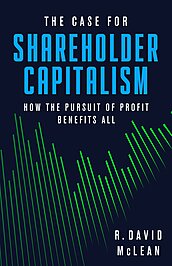Unlock the power of shareholder capitalism—a system that transcends zero‐sum games and Wall Street stereotypes. In its essence, shareholder capitalism enables mutually beneficial trade, a concept ingrained in human history for over 300,000 years. This approach fosters specialization, fuels innovation, and propels economic growth.
In this engaging new book, David McLean explains how embracing shareholder capitalism doesn’t negate the significance of other institutions; rather, it allows businesses to excel in providing the goods, services, and jobs that make society better off. Shareholder capitalism isn’t about disregarding stakeholders; it thrives on mutually beneficial partnerships. Managers are entrusted to maximize shareholder value, focusing on companies’ long‐term success, which drives overall prosperity. Profits, the ultimate measure of value, steer businesses toward creating goods and services that benefit society.
While shareholder capitalism is the overarching theme in Finance 101 courses, it is increasingly criticized, especially with the popularization of concepts like ESG investing and stakeholder capitalism. McLean argues that corporate social responsibility, while well‐intentioned, shouldn’t replace the democratic process in policymaking, and can lead to unintended consequences. Our journey through capitalism, beginning around 1800, has brought unprecedented prosperity, and it’s essential to safeguard this system for the betterment of society, with democracy and free trade as our guiding beacons.
